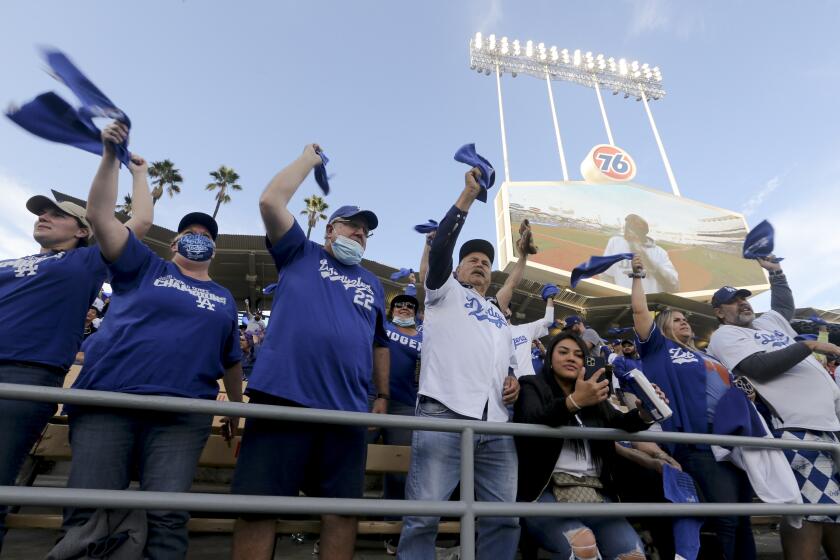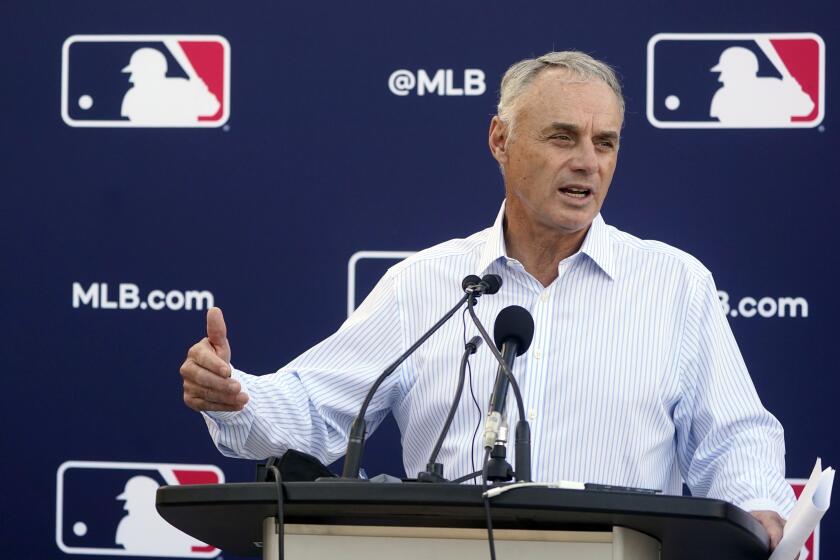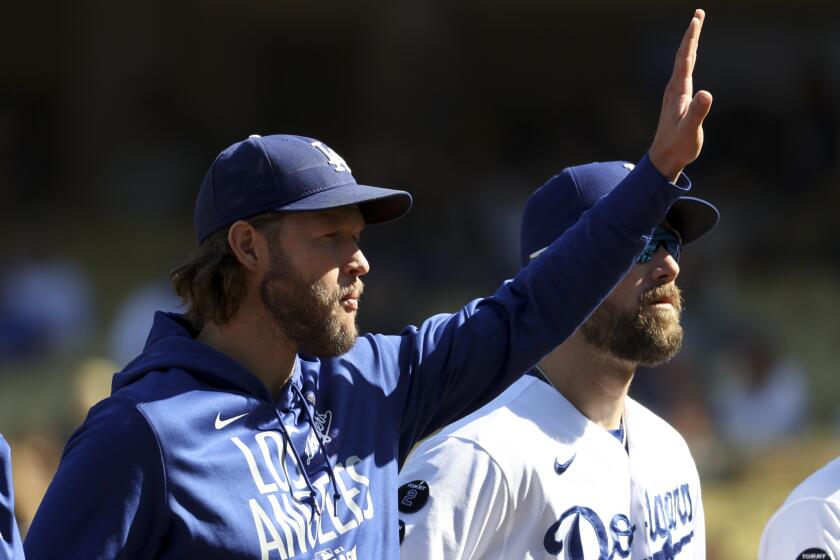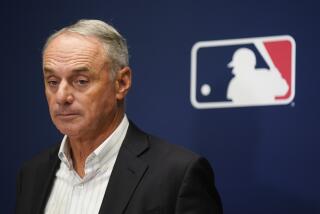A continuing lockout, canceled games and a lot of anger. What’s next for MLB?
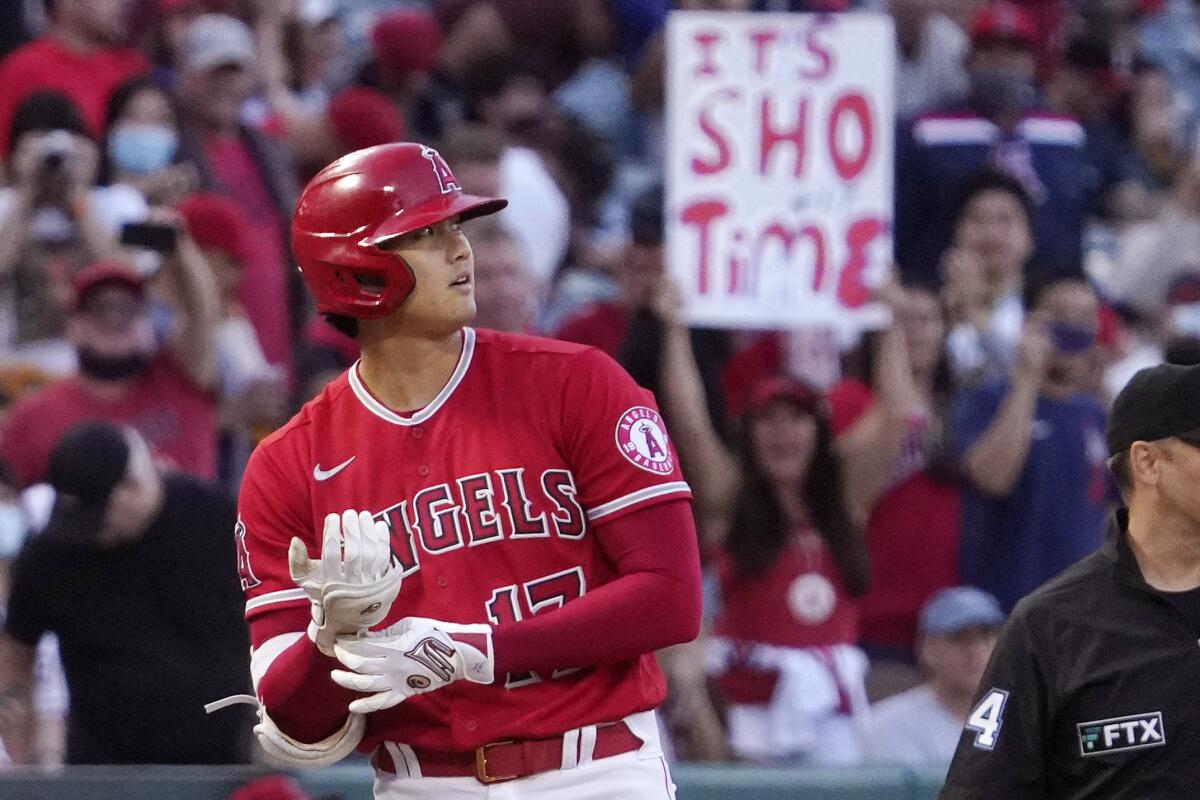
- Share via
If negotiations for a new collective bargaining agreement were akin to a benches-clearing brawl, players and owners would be bunched in front of the mound, their bullpens and dugouts having emptied, pointing fingers and hurling insults toward one another, with some needing to be restrained.
Baseball reached such an inflection point with Tuesday’s breakdown in talks and cancellation of the first week of regular-season games, leaving players, owners, fans and all whose livelihoods depend on the sport to wonder: Will fists start to fly or will cooler, more conciliatory heads prevail?
Spring training games were pushed back to March 12 and the first two series of the regular season, scheduled to begin March 31, have been canceled, reducing the schedule from 162 games to 156 games.
Players and owners left Jupiter, Fla., with nine days of negotiations failing to net an agreement. Now what?
The sides were expected to take Wednesday to regroup and resume talks as early as Thursday in New York City, where perhaps a more behind-the-scenes approach, in which details of every offer and counteroffer aren’t leaked to reporters and blow-by-blow accounts of negotiations aren’t filling Twitter feeds, might prove more fruitful.
Most minor leaguers have begun spring training workouts or will by next week. Players on 40-man rosters and 200 or so unsigned free agents will continue offseason workouts as normal. They will have the option of training in larger groups at camps set up by the union in Mesa, Ariz., and Florida.
Thanks to stubborn owners, the MLB lockout will see fans lose seats, ushers and concessionaires lose livelihoods, and TV viewers lose a companion.
“Guys continue to work through the calendar as they normally would,” union head Tony Clark said, “so that fans can be completely confident that when the lights come on, they’ll be ready to go.”
Where do negotiations stand now?
While both sides acknowledged that progress was made on certain issues in Florida, Bruce Meyer, the union’s chief negotiator, said “there were major issues on which we were very far apart.” Those include luxury tax thresholds and penalties for exceeding them and how much teams will pay young players who are not yet eligible for arbitration.
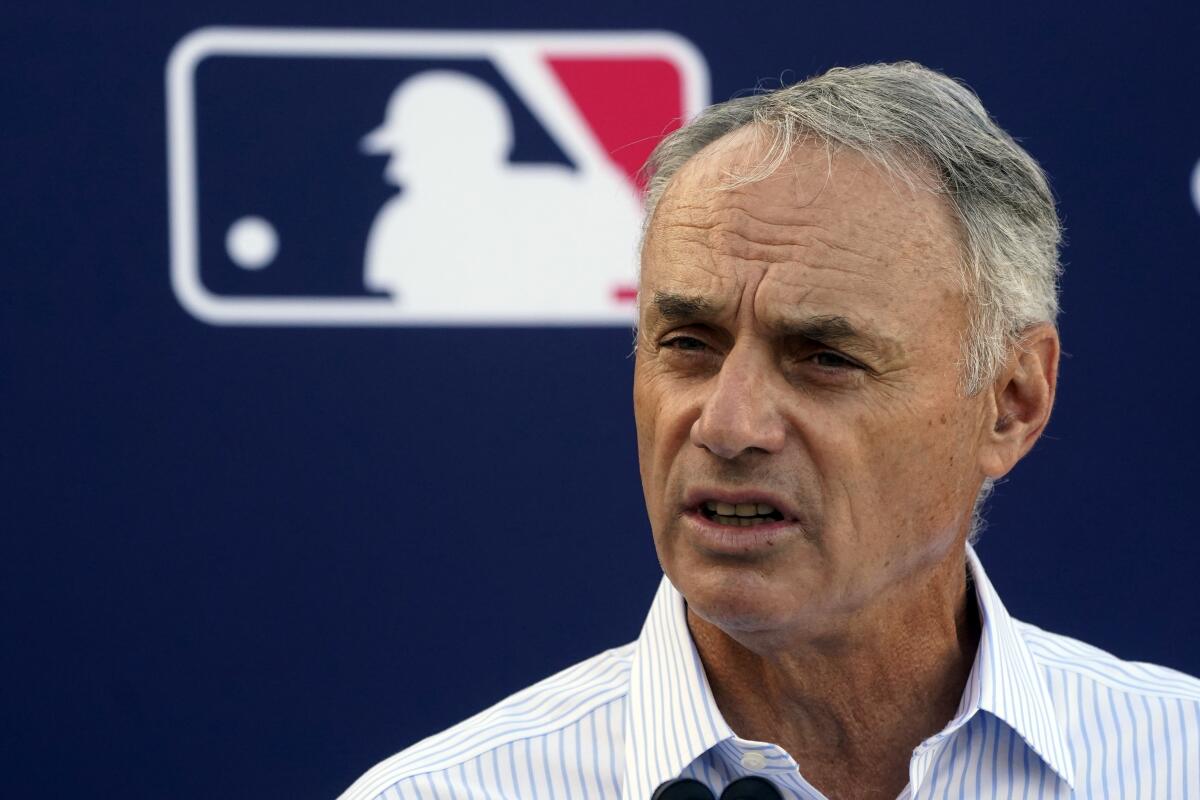
Rhetoric was ratcheted up on Tuesday, with Clark accusing Commissioner Rob Manfred of using the lockout as “the ultimate economic weapon” in an attempt to break the union and numerous players lashing out at Manfred and the owners.
Animosity between the sides, who both seem entrenched in their positions and belief that the other side is more to blame for the ninth work stoppage in baseball history, might be at an all-time high. So does solidarity among the players.
“We’re prepared. We’ve seen this coming. It’s unfortunate, but this isn’t new to us, it’s not shocking,” said veteran reliever Andrew Miller, a member of the union’s executive board. “But our willingness to find solutions and to fight for what’s right is nothing like I’ve ever seen before, I can tell you that.”
When might more games be canceled?
Since Manfred announced that the first week of regular-season games would be canceled, it stands to reason that Major League Baseball would only call off one week of games at a time. Any attempt to cancel a bigger block of games would be perceived as an aggressive — even hostile — act by owners and drive an even deeper wedge between them and the players.
So if an agreement is not reached by the middle of next week, there is a good chance another week’s worth of games will be canceled. MLB’s preference is to retain a four-week spring training, but players don’t believe it would take that long to prepare for the season. Spring training was shortened to three weeks before the lockout-impacted 1990 season, strike-delayed 1995 season and pandemic-shortened 2020 season.
Can games be made up?
In the minds of MLB and the owners, those first six regular-season games are going, going, gone. For good. Not so in the minds of the players, who will try to negotiate a 162-game season or 162 games of pay in a back-to-work agreement.
MLB Commissioner Rob Manfred had a lot to say about his decision to cancel the first week of the season. There a lot’s more we wish he would have said.
“It would be our position, if games are canceled, that as a feature of any deal to come back, we would be asking for compensation and/or to have those games rescheduled,” Meyer said. “If the league decides unilaterally to pull down games, and then we have a deal, then players should get compensated for those games.”
After the 1990 lockout, the season was pushed back a week, to April 9, and a 162-game season stretched into the first week of October. If players don’t get paid for 162 games, they probably won’t agree to expanded playoffs for this season.
According to Andrew Marchand of the New York Post, ESPN is set to pay MLB an extra $100 million a year to televise games in a 14-team playoff format or $85 million in a 12-team format. That’s what MLB stands to lose if the union doesn’t agree to expand the current 10-team playoff field.
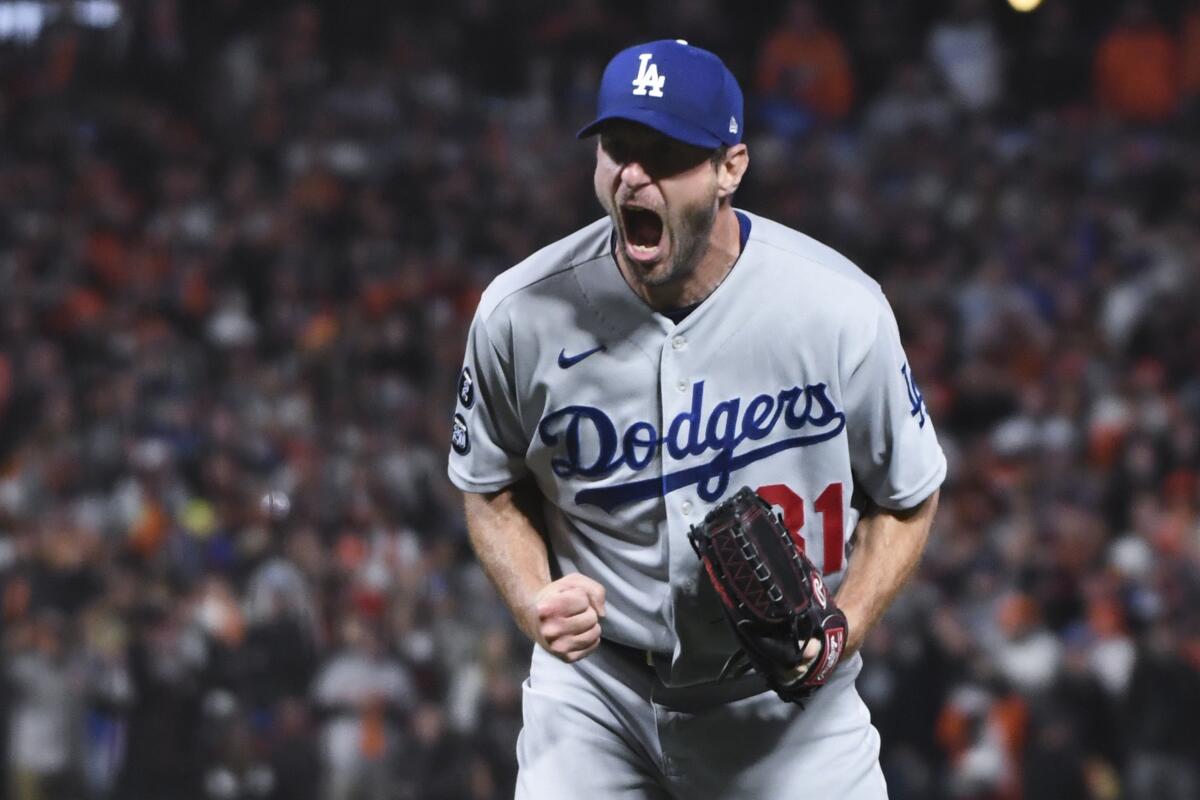
How much money will players lose?
According to the Associated Press, major leaguers would combine to lose $20.5 million for each day that is wiped off the 186-day regular-season calendar, from a whopping $232,975 a day for Max Scherzer and $190,591 a day for Mike Trout to $3,387 a day for those making a major league minimum of $630,000. There could also be future penalties for young stars.
Once 15 days of the regular season are missed, the free-agent eligibility of such players as Angels two-way phenom Shohei Ohtani and New York Mets slugger Pete Alonso would be delayed by a year unless management agrees to credit them for service time in an agreement. If not, Ohtani’s free agency would be pushed from after the 2023 season to the end of 2024.
The union distributed monthly stipends of $5,000 to players on Feb. 1 and March 1, and Clark said it will increase that stipend to $15,000 on April 1.
Will the All-Star game be played in Dodger Stadium?
The Dodgers lost the game to the pandemic in 2020, so MLB will make every effort to play it in Chavez Ravine as scheduled on July 19.
If the lockout drags into late-June and is settled by July, MLB could reprise its script from 1981, when the July 14 All-Star game was canceled because of a players’ strike that lasted from June 12 to July 31 and was brought back on Aug. 9 in Cleveland’s Municipal Stadium to kick off the second half of the season.
What can people do about tickets for canceled games?
Both the Dodgers and Angels are offering fans credit toward the purchase of future tickets or refunds for exhibition and regular-season games. The Dodgers have asked fans to choose between a credit or refund by Monday. The Angels have not issued such a deadline.
What is the risk of long-term damage to the game?
Plenty, according to Patrick Rishe, director of the sports business program at Washington University’s Olin Business School in St. Louis.
“That none of my 50 Gen Z-aged sports business college students raised their hands when I asked if the MLB lockout was on their radar reflects the larger concern for the sport,” Rishe said in an email. “Namely, indifference and irrelevance with a growing percentage of young people.
“If you don’t build the fan loyalties of the 12- to 22-year-olds today, who will be buying season tickets a generation from now? Lockouts during a pandemic and a period of soaring inflation adversely impacting the real income of American workers gains neither sympathy nor loyalties from would-be fans.”
The Dodgers have a lot of work to do with their roster, but little can happen as long as the MLB lockout continues.
More to Read
Go beyond the scoreboard
Get the latest on L.A.'s teams in the daily Sports Report newsletter.
You may occasionally receive promotional content from the Los Angeles Times.

